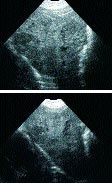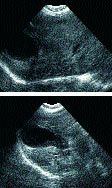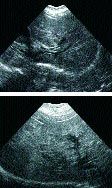Chronic hepatitis usually shows history of increased serum liver enzymes
Signalment: Canine, Shepherd cross, 11 years old, female spayed, 46.8 lbs.
Signalment:
Canine, Shepherd cross, 11 years old, female spayed, 46.8 lbs.
Clinical history:
The dog presents with vomiting and icterus. Therapy has included Actigall, metronidazole, Baytril and prednisone.
Physical examination:
The findings include rectal temperature 101.6° F, heart rate 110/min, pink mucous membranes, and normal capillary refill time. Normal heart and lung sounds are heard.
Laboratory results:
A complete blood count, serum chemistry profile, and urinalysis were performed and are as follows.
Ultrasound examination:
Thorough abdominal ultrasonography was performed.
My comments:
The liver is echobright and has irregular margins and shows hypoechoic areas in its parenchyma. Fine needle aspirations of the liver for cytologic examination are obtained. The gall bladder is mildly distended, and its walls are not thickened or hyperechoic. The common bile duct is slightly dilated. The spleen shows a uniform echogenicity in its parenchyma - no masses noted. The left and right kidneys are similar in size, shape and echotexture. No masses or calculi were noted in either kidney. The urinary bladder is distended with urine and contains some urine sediment material - no masses or calculi noted. The stomach, left adrenal gland, small intestine and pancreatic region are normal.

Table 1: Results of laboratory tests
Liver cytologic examination:
The smears contain numerous large clusters of well-preserved hepatocytes. These hepatocytes show mild to moderate cytoplasmic fine vacuolar degeneration and intracellular accumulation of bile pigments. There are several extracellular bile casts. Multiple focal areas of hepatocytes show moderate to severe cytoplasmic fine infiltration – suggesting benign nodular regeneration. There is moderate infiltration by inflammatory cells composed of a mixture of neutrophils in good morphological condition, small lymphocytes, medium-sized lymphocytes and occasional plasma cells.
There is no evidence of sepsis or neoplasia. The cytologic diagnosis is moderate mixed suppurative and lymphocytic hepatitis with severe cholestasis and multifocal benign nodular regeneration.
Case management:
In this case, chronic liver disease is the clinical diagnosis. This dog's liver disease is chronic hepatitis with regenerative nodules. These cases of chronic hepatitis usually have a long history of increased serum liver enzymes. Fluid and antibiotic therapy is important in the clinical management of severely icteric dogs. I generally will feed these dogs Prescription Diet L/D and daily administer Denosyl SD4 (18 mg/kg PO SID), milk thistle (silymarin, 4-8 mg/kg PO SID) and/or vitamin E (400-800 units PO SID).

Image 1 and 2.
Periodic use of prednisone (1-2 mg/kg BID for 5-7 days) and oral lactulose (0.25-0.5 ml/kg PO BID) are needed to get the dog back to eating again and improve the dog's activity.
I suspect that the liver disease in this dog may be controlled but will not be cured. I would from here on be careful with any drug use in this dog that requires metabolism by this dog's liver. Therapy of special diet and antioxidants is probably for a lifetime.
Review of treatment of chronic hepatitis in dogs
The treatment of chronic hepatitis in dogs remains speculative as controlled clinical trials with large numbers of dogs have not been performed. The necroinflammatory response is usually progressive, and most dogs do not go into spontaneous remission. If cirrhosis is present, the likelihood of successfully managing the case is low. Therefore, the prognosis is poor in severe cases, and most of these dogs die within several weeks to months despite appropriate treatment.

Image 3 and 4.
Early detection is important. The basic goals in treating dogs with chronic hepatitis are to arrest inflammation; resolve fibrosis; and correct nutritional imbalances and treat hepatic encephalopathy with dietary management.
Although there are no controlled trials involving glucocorticoids in the treatment of dogs with chronic hepatitis, many veterinarians have had success using them as part of the therapeutic regimen. The starting dosage of prednisone is 1 to 2 mg/kg/day. Once clinical remission is achieved (usually three to four weeks), the dosage of prednisone is gradually tapered to a low maintenance dosage (approximately 0.25 mg/kg daily or about five to seven days every four to six weeks). During the tapering process, animals may be monitored with serum chemistry profiles for relapses.
The use of the hydrocholeretic drug ursodeoxycholic acid (ursodiol; Actigall or Urso) may be helpful. It is believed that ursodeoxycholic acid has anti-inflammatory, immunomodulatory and choleretic effects. Use of ursodeoxycholic acid may be considered as either primary or adjunctive (in combination with immunosuppressive or anti-inflammatory drugs) treatment in animals with chronic liver diseases. A safe and effective dose is 15 mg/kg daily, administered either once daily or divided twice a day. The drug should be given with food. Studies need to be performed to substantiate its efficacy and dosage in the dog.
S-adenosylmethionine (SAMe) is a nutraceutical currently being used in a variety of hepatic diseases including chronic hepatitis. It is an essential molecule in hepatocyte intracellular pathways of drug detoxification, hepatocyte membrane functions and antioxidation. Without SAMe there can be glutathione depletion and subsequent severe oxidative damage, toxin retention and free radical accumulation.

Image 5 and 6.
Supplementation with SAMe has the potential to improve hepatocyte function by stimulating cell repair, scavenging free radicals, suppressing inflammation, improving membrane function and enhancing toxin neutralization. It is given as an enteric-coated tablet (Denosyl-SD4) at a dosage of 18 mg/kg daily. It is better absorbed in the fasted state. Side effects of this drug are rare.
Milk thistle (Silybum marianum) is an edible herbaceous annual or biennial plant native to warm, dry areas in southern Europe and northern Africa, and has been used as food in the countries surrounding the Mediterranean. Milk thistle has been used for liver problems for more than 2,000 years. A group of active ingredients collectively called silymarin (silybinin, isosilybinin, silychristin and silydianin, etc.) is derived from milk thistle, mainly from the seeds.
Silymarin in the milk thistle extracts is known to protect the liver by strengthening the outer membranes of liver cells, which prevents toxins from entering the cells. Silymarin also stimulates protein synthesis in liver cells, which helps to regenerate and repair the liver.
Milk thistle silymarin compounds are also strong antioxidants, and have been shown to reduce damage to liver cells caused by repeated use of some prescription drugs and may protect liver from cirrhosis, hepatitis and pollutants. Recent studies have shown that milk thistle extract may also be beneficial for reducing the chance for certain cancers.
With almost no known side effects (milk thistle is a food) and well-known hepatoprotective efficacy, it is said that milk thistle can't be beat as a liver protector.
Vitamin E therapy is also recommended in chronic hepatitis. Oxidative injury to the liver is now well recognized in several types of inflammatory processes. Free radicals are generated in chronic hepatitis by the injurious effects of certain drugs, toxins or immunologic injury. These free radicals can damage cellular macromolecules via lipid peroxidation and thus participate in cellular injury, and play an important role in initiating and/or perpetuating hepatic injury. Vitamin E reduces oxidant injury to hepatic tissue by providing protection from free radicals. A water-soluble formulation of Vitamin E is used at a dosage of 15 units/kg bid.
Dr. Hoskins is owner of DocuTech Services. He is a diplomate of the American College of Veterinary Internal Medicine with specialities in small animal pediatrics. He can be reached at (225) 955-3252, fax: (214) 242-2200, or e-mail: johnny@docutechservices.com.